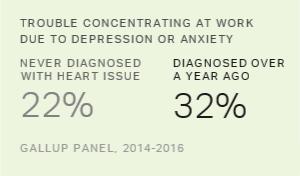Cardiovascular disease (CVD) currently kills more Americans each year and costs more than any other disease, including Alzheimer's and diabetes. Over the next decade, the situation will only get worse: By 2030, the prevalence of CVD among those aged 20 and older is projected to top 40%, and direct medical costs are expected to triple to more than $800 billion.
A recent study published in International Journal of Environmental Research and Public Health -- based on data drawn from Gallup surveys of more than 412,000 full-time workers in the U.S. between 2010 and 2012 -- suggests that workplace supervisors could be part of the solution to this deadly and costly problem.
A number of previous studies have established links between workplace stress and CVD risk factors. But because trust is such an important part of social capital, particularly in the workplace, the authors of this study chose to examine the associations between trust at work and seven CVD risk factors: smoking, obesity, low physical activity, poor diet, diabetes, high cholesterol and high blood pressure.
The authors adjusted the regression models for demographic characteristics with each of the seven risk factors as dependent variables. As their independent trust variable, the researchers used a work environment question that asked: "Does your supervisor always create an environment that is trusting and open, or not?"
Twenty-one percent of all U.S. workers surveyed answered "no." For both women and men, the highest prevalence of mistrust was among workers aged 45 to 64 (women, 24.4%; men, 23.0%), followed by those in the 30 to 44 age group (women, 22.3%; men, 20.5%).
Overall, the authors found that trust was associated with increased adjusted odds of having many of the seven CVD factors. Among those workers whose supervisor created a mistrustful environment (those who answered "no" to the question), the odds ratios were the greatest (more than 20%) for having four or more of the seven risk factors.
After the authors adjusted for demographic factors and whether respondents had health insurance, they found that trust was associated with seven CVD risk factors among both women and men in the sample.
- Workers who do not work in an open, trusting environment had greater odds of having high blood pressure, high cholesterol and diabetes.
- Workers in mistrustful environments also were more likely to be current smokers, have a poor diet and be obese.
- Women who work in mistrustful environments had greater odds of low physical activity.
- Odds ratios for having four or more risk factors were elevated in mistrustful environments.
| Women | Men | ||||||||||||||||||||||||||||||||||||||||||||||||||||||||||||||||||||||||||||||||||||||||||||||||||
|---|---|---|---|---|---|---|---|---|---|---|---|---|---|---|---|---|---|---|---|---|---|---|---|---|---|---|---|---|---|---|---|---|---|---|---|---|---|---|---|---|---|---|---|---|---|---|---|---|---|---|---|---|---|---|---|---|---|---|---|---|---|---|---|---|---|---|---|---|---|---|---|---|---|---|---|---|---|---|---|---|---|---|---|---|---|---|---|---|---|---|---|---|---|---|---|---|---|---|---|
| OR (95% CI)* | OR (95% CI)* | ||||||||||||||||||||||||||||||||||||||||||||||||||||||||||||||||||||||||||||||||||||||||||||||||||
| High blood pressure | 1.15 (1.11, 1.20) | 1.20 (1.16, 1.24) | |||||||||||||||||||||||||||||||||||||||||||||||||||||||||||||||||||||||||||||||||||||||||||||||||
| High cholesterol | 1.18 (1.13, 1.22) | 1.22 (1.18, 1.26) | |||||||||||||||||||||||||||||||||||||||||||||||||||||||||||||||||||||||||||||||||||||||||||||||||
| Diabetes | 1.15 (1.09, 1.23) | 1.18 (1.12, 1.25) | |||||||||||||||||||||||||||||||||||||||||||||||||||||||||||||||||||||||||||||||||||||||||||||||||
| Current smoker | 1.15 (1.10, 1.20) | 1.15 (1.11, 1.19) | |||||||||||||||||||||||||||||||||||||||||||||||||||||||||||||||||||||||||||||||||||||||||||||||||
| Poor diet | 1.10 (1.07, 1.14) | 1.11 (1.07, 1.15) | |||||||||||||||||||||||||||||||||||||||||||||||||||||||||||||||||||||||||||||||||||||||||||||||||
| Insufficient physical activity | 1.10 (1.06, 1.14) | 1.08 (1.05, 1.11) | |||||||||||||||||||||||||||||||||||||||||||||||||||||||||||||||||||||||||||||||||||||||||||||||||
| Obese | 1.18 (1.14, 1.23) | 1.18 (1.15, 1.22) | |||||||||||||||||||||||||||||||||||||||||||||||||||||||||||||||||||||||||||||||||||||||||||||||||
| Four or more risk factors | 1.22 (1.16, 1.27) | 1.29 (1.25, 1.34) | |||||||||||||||||||||||||||||||||||||||||||||||||||||||||||||||||||||||||||||||||||||||||||||||||
| Models adjusted for age, race/ethnicity, education, marital status, family income and health insurance; *Odds ratios and 95% confidence intervals; Recreated with permission | |||||||||||||||||||||||||||||||||||||||||||||||||||||||||||||||||||||||||||||||||||||||||||||||||||
| Gallup-Sharecare Well-Being Index, 2010-2012 | |||||||||||||||||||||||||||||||||||||||||||||||||||||||||||||||||||||||||||||||||||||||||||||||||||
Conclusion
Negative work environments -- particularly mistrustful ones, as identified in this study -- may contribute to greater odds of having CVD risk factors. As such, supervisors' behavior can play an important role in improving the health of the people they supervise. Therefore, workplace intervention programs for CVD and other chronic health conditions may wish to consider addressing this aspect of workplace social capital, including supervisor competencies and behavior, with proper training as a potential means to improve worker health.
Read the full paper, Trust in the Work Environment and Cardiovascular Disease Risk: Findings From the Gallup-Sharecare Well-Being Index.
The authors of the study are Toni Alterman, Ph.D., Senior Epidemiologist, NIOSH; Rebecca Tsai, Ph.D., Epidemiologist, NIOSH; Jun Ju, M.S., IT Specialist, NIOSH; and Kevin M. Kelly, Ph.D., Deputy Director, Healthier Workforce Center of the Midwest, University of Iowa.




